Key takeaways:
- Reparations encompass more than financial compensation; they involve acknowledging historical injustices and fostering emotional journeys for both victims and society.
- Effective proposals in reparations require clarity, community engagement, and thorough research to resonate with those they aim to serve.
- Persistence and adaptability are crucial for success in advocacy; setbacks can lead to valuable lessons and new perspectives.
- Storytelling and tailored communication enhance proposals by creating emotional connections and aligning with community voices.

Understanding reparations politics
Reparations politics is a complex and often contentious subject that asks us to confront historical injustices head-on. It isn’t just about monetary compensation; it’s also about acknowledging past wrongs and creating pathways for authentic reconciliation. I remember a community meeting I attended where participants shared their stories of generational trauma. The weight of those testimonies reminded me that reparations is as much an emotional journey as it is a political one.
What strikes me deeply is how reparations challenge our understanding of justice. Can we really quantify the pain inflicted by centuries of oppression? As I reflect on this, I think about the moral responsibility we hold to rectify these wrongs, not only for the victims but for society as a whole. Engaging with these ideas pushes me to ask how we can create systems that not only compensate but also educate and empower future generations.
The various approaches to reparations—from direct payments to institutional reforms—illustrate a spectrum of possibilities. I often wonder which method resonates most with marginalized communities. One discussion I had with a local activist highlighted that, while cash payments can provide immediate relief, true reparation includes land, resources, and opportunities for building a sustainable future. This insight made me realize that understanding reparations politics requires us to listen closely to those who have been affected; their voices must guide our next steps.
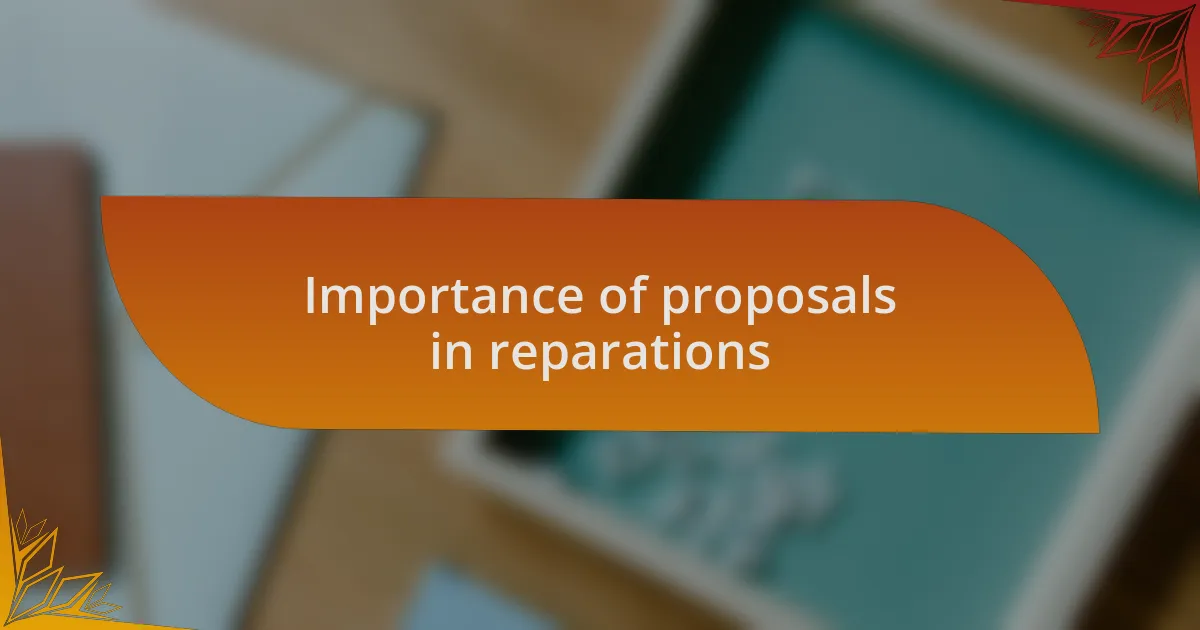
Importance of proposals in reparations
Proposals are the backbone of effective reparations initiatives, articulating a vision for justice that can mobilize communities and policymakers alike. I recall a pivotal moment during a local roundtable, where a well-crafted proposal sparked passionate discussions among attendees. It became evident to me that a strong proposal not only outlines compensatory mechanisms but also fosters a shared understanding of the historical context and ongoing impacts of oppression.
The importance of proposals in reparations lies in their ability to spark dialogue and bring diverse perspectives to the forefront. I once sat in on a workshop where individuals from various backgrounds shared their thoughts on reparation strategies. This event demonstrated how proposals could serve as a catalyst for engagement, prompting questions like, “What form of redress resonates most with our community’s needs?” In my experience, these conversations not only enlighten participants but also ensure that any proposed solutions remain community-centered.
Effective proposals can also highlight the urgency of addressing injustices and building a more equitable society. During my time volunteering with a grassroots organization, I witnessed how a compelling proposal led to unprecedented support from local leaders. This experience underscored for me how proposals can galvanize momentum, transforming abstract concepts into tangible actions that hold the potential to effect real change.
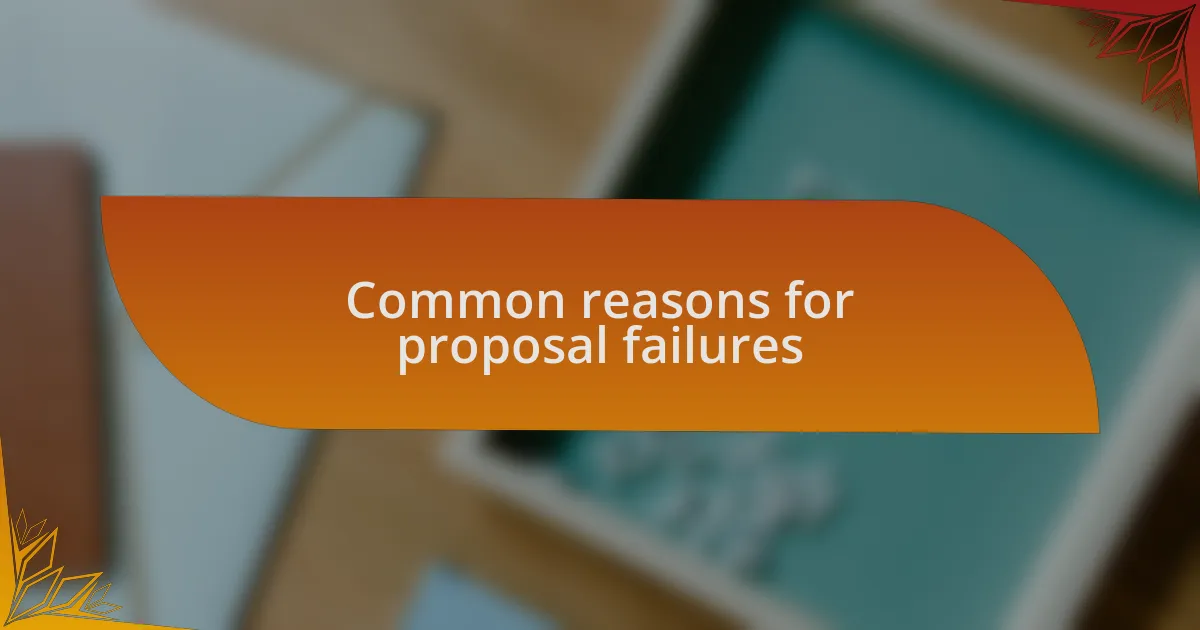
Common reasons for proposal failures
Proposals often fail due to a lack of clarity in their objectives. I remember reviewing one proposal that was packed with ideas but didn’t clearly define its goals. It left me wondering, what exactly was the intended outcome? Without a precise vision, it can be challenging to rally support and enthusiasm from stakeholders.
Another common pitfall is insufficient engagement with the community. In my experience, I’ve seen proposals that didn’t reflect the voices of those they aimed to serve. It’s disheartening when proposals overlook grassroots input, leaving crucial perspectives out of the conversation. How can we build a movement for justice if we’re not actively listening to those affected?
Additionally, inadequate research can undermine the strength of a proposal. I once encountered a project that relied on outdated statistics to support its claims. This oversight not only weakened its credibility but also made me question the proposal’s viability. Why risk alienating potential allies when thorough research could bridge gaps in understanding and support? Engaging deeply with the data and community experiences is essential for crafting a robust proposal that resonates.
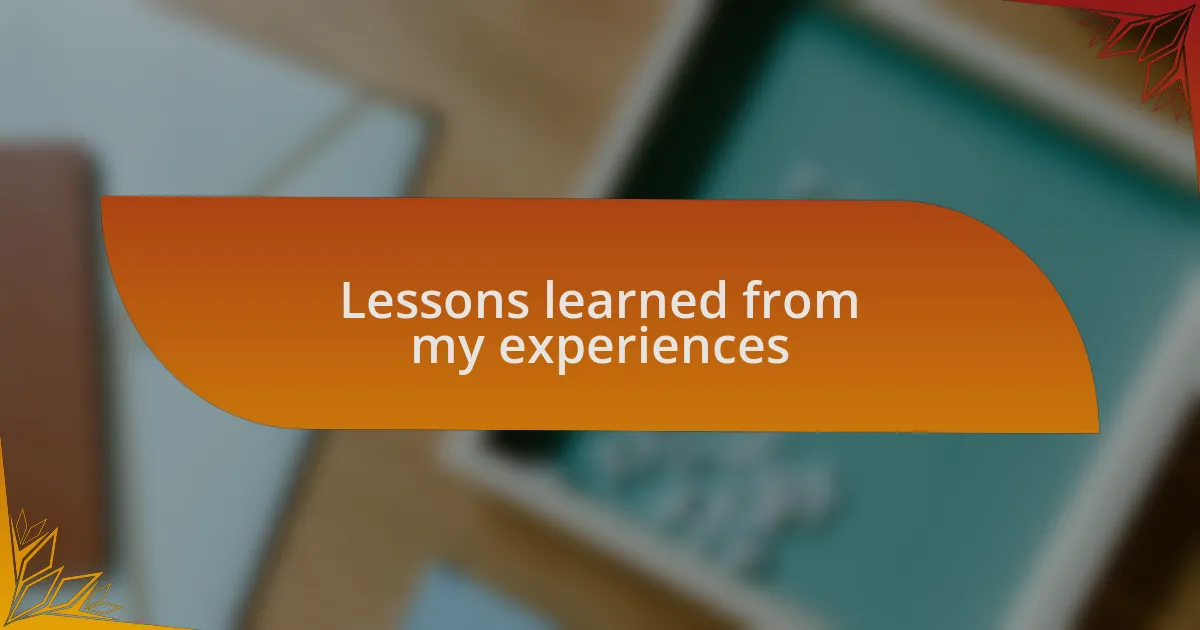
Lessons learned from my experiences
One key lesson I’ve learned is the importance of iterative feedback during the proposal development process. I recall a time when I shared a draft early on with a diverse group of community members. Their input was invaluable; it highlighted gaps I hadn’t noticed and opened my eyes to perspectives that truly mattered. This experience reinforced my belief that collaboration can transform a good proposal into a great one.
Another insight that struck me is the significance of aligning proposals with the urgent needs of the community. In a project I once worked on, I became too focused on what I thought the solution should be rather than what those facing the issues actually wanted. It was a humbling moment when I realized that my vision didn’t match the reality on the ground. I now approach proposals with a mindset that prioritizes real-life impact over theoretical ideals.
Lastly, I’ve discovered that persistence is essential, even in the face of rejection. After one unsuccessful proposal, I felt disheartened and questioned whether my efforts were in vain. However, this setback inspired me to refine my approach and come back stronger. It made me realize that failure isn’t really the end; it’s an opportunity to learn and grow, prompting me to ask: How can we turn setbacks into stepping stones toward success?
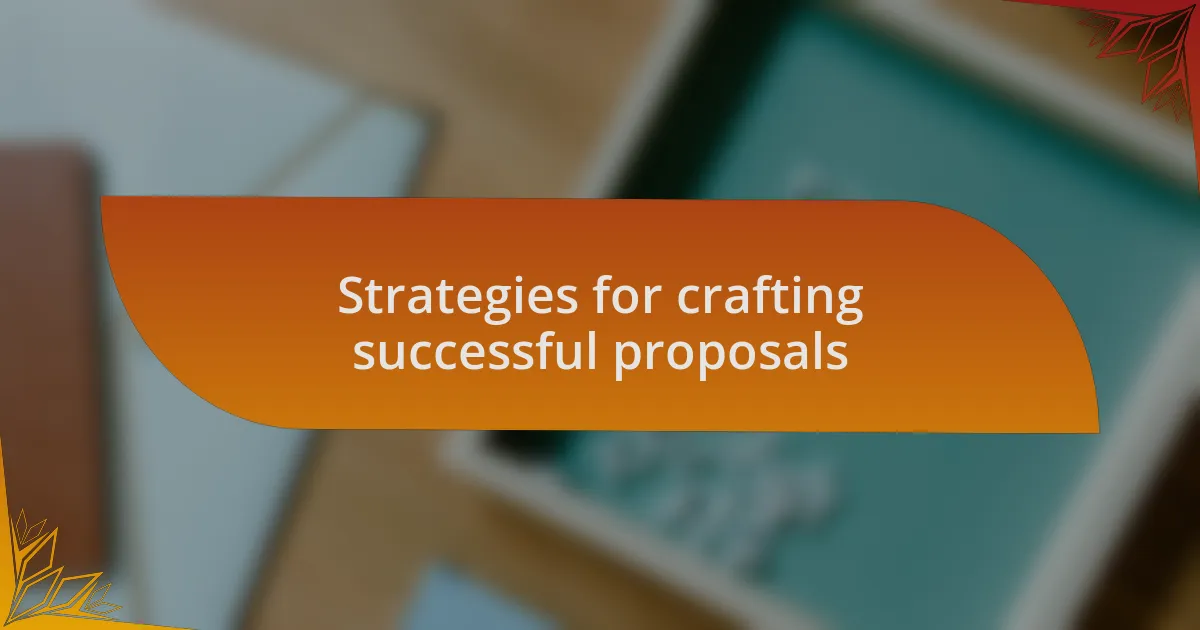
Strategies for crafting successful proposals
One strategy I’ve found effective is to start with a clear, focused goal. In one proposal, I began with an intricate solution that I thought was innovative, but ultimately, I lost sight of what we were trying to achieve. By simplifying my objective and addressing the core issue directly, my proposal became much more compelling. It leads me to wonder: how often do we overcomplicate our visions at the expense of clarity?
Another essential tactic is storytelling. I remember crafting a proposal that included a compelling narrative about a community’s journey rather than just statistics. This narrative engaged the reviewers emotionally, creating a connection that raw data might have failed to establish. Isn’t it fascinating how a well-told story can transform numbers into a vivid call to action?
Lastly, I believe in the power of tailoring your language to your audience. Early on, I struggled with proposals that used jargon-heavy language that alienated potential supporters. After I focused on clear, relatable terms that reflected the community’s voice, I noticed a significant increase in positive feedback. How can we ensure that our words resonate rather than confuse?
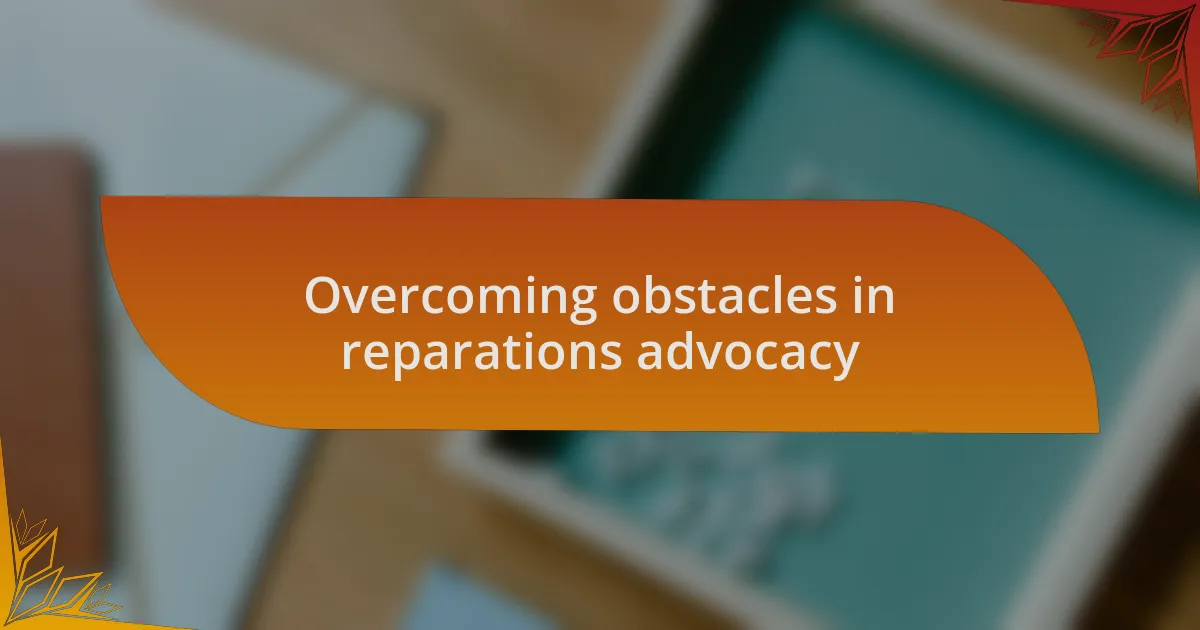
Overcoming obstacles in reparations advocacy
Navigating the landscape of reparations advocacy often feels like maneuvering through a maze filled with obstacles. I recall a pivotal moment when a critical proposal was met with fierce opposition. Instead of feeling defeated, I chose to engage directly with dissenters. We organized open forums, allowing everyone to voice their concerns. This approach transformed resistance into dialogue, and it served as a valuable reminder: when faced with adversity, open communication can foster understanding and collaboration.
Another challenge we’ve encountered is confronting deeply ingrained historical misconceptions about reparations. I remember needing to dispel a common myth that reparations only benefit a few. By inviting community members to share their experiences and illustrating how reparations can uplift entire communities, I saw a shift in perceptions. It was enlightening to witness how personal stories shattered preconceived notions—how do we cultivate an environment where such stories take center stage?
In the realm of advocacy, perseverance is key. I’ve had my share of setbacks when proposals didn’t land as expected. However, I learned that each rejection provides an opportunity for growth. After a particularly tough rejection, I took time to reflect and gathered feedback from colleagues. This collaborative approach strengthened my resolve and informed my next steps. What if we embraced failures not as dead ends, but as stepping stones on our path to justice?
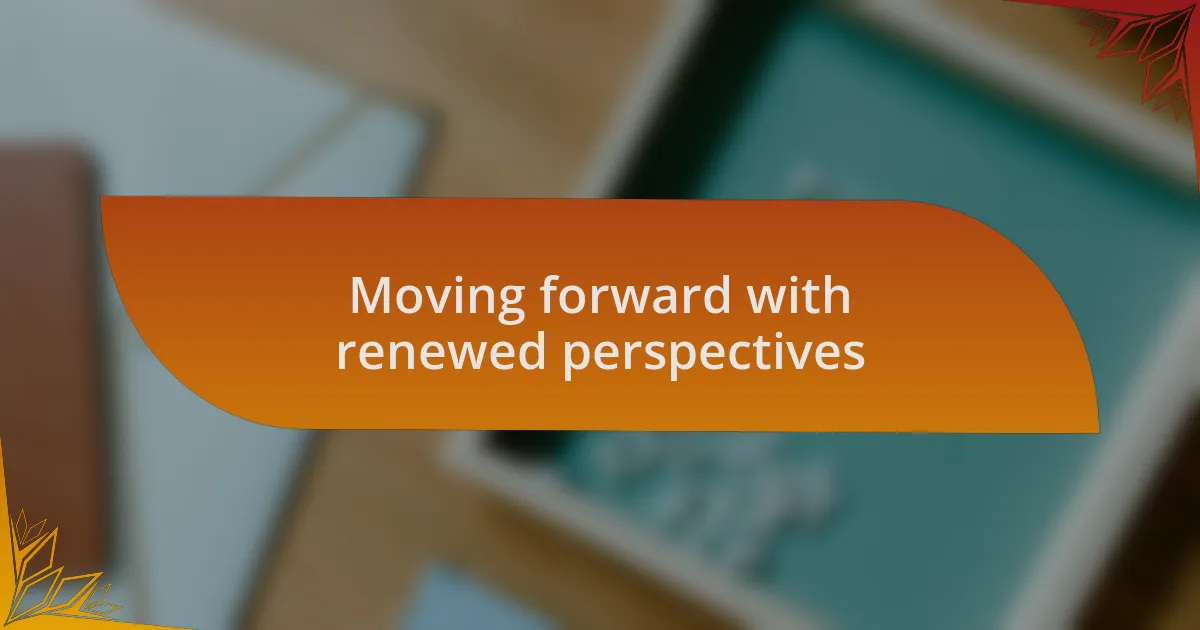
Moving forward with renewed perspectives
As I reflect on my journey in reparations advocacy, I’ve come to realize that each setback ultimately unveils a new perspective. For instance, after a proposal I believed in strongly fell flat, I took a step back and consulted with mentors who had faced similar challenges. Their insights highlighted the importance of adaptability in our strategies; it’s not about sticking rigidly to one plan but being willing to pivot and reassess. How often do we allow ourselves the space to see beyond our initial failures?
During one particularly challenging period, I found myself grappling with frustration after an important initiative lost momentum. It was a conversation with a community leader that shifted my focus. They reminded me that our work isn’t just about winning proposals; it’s about cultivating relationships and understanding the nuanced needs of the communities we seek to support. Engaging in these heartfelt dialogues transformed my frustration into a source of inspiration. What if we viewed every challenge as a chance to connect deeper with those we aim to serve?
The notion of renewed perspectives has become my guiding principle. I remember a workshop we held after a major proposal was rejected, where we invited participants to brainstorm new ideas collaboratively. This session ignited innovative approaches I hadn’t considered before, reinforcing the idea that our collective wisdom can be more powerful than any single proposal. Isn’t it fascinating how sometimes the best paths forward emerge from the ashes of what didn’t work?